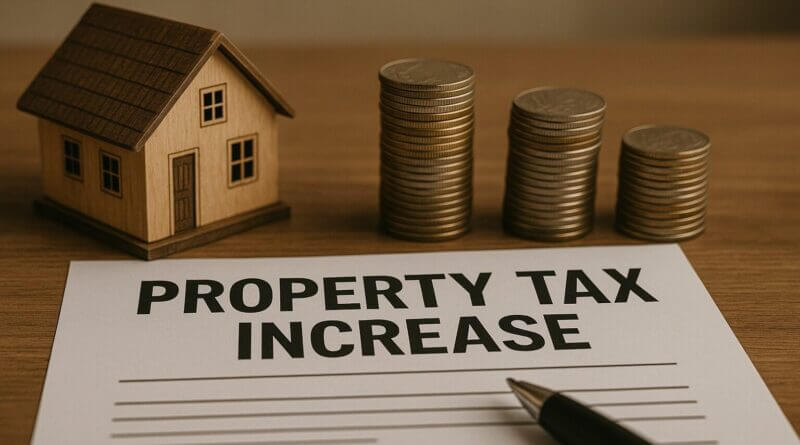Kitchens: Property tax hike and effect on real estate market and homeowners
Note: This article contains the views of Alderman/Broker Kit Kitchens, who is solely responsible for its content. The views expressed are his only and not necessarily that of this publication.
By Kit Kitchens
Hernando Ward 5 Alderman, Principal Broker of Kitchens Realty Group
A buyer who purchases a home, with a 30-year mortgage, will pay roughly 115 percent more per month than they would have in January of 2020. This staggering increase has manifested in three of the four elements of your typical mortgage payment.
- Principal: In January of 2020 the median DeSoto County home sold for $210,000. In July of this year, the median home price was $333,900. This amounts to a 63 percent increase.
- Interest: At the beginning of 2020 the median interest rate nationally was 3.11 percent. Today a buyer with a 30-year fixed mortgage would get a rate somewhere in the ball park of 6.75 percent. Not only is this more than a 100 percent increase in the rate, but when you pair that with the 63 percent increase in principal, you have an enormous cost increase.
Ex: A buyer who purchased a home with a five percent down 30-year conventional loan in 2020 with a price of $210,000 and an interest rate of 3.11 percent would have a PI payment of about $921 per month. That same buyer today would be spending $333,900 for their home and with an interest rate of 6.75 percent would pay about $2,165 per month. An increase of 135 percent.
- Insurance: While it is harder to find how much home insurance rates have increased in DeSoto County, based on national numbers we can estimate that it is between 30-40 percent.
Up until now the silver lining has been that property taxes have remained low. But with the looming property tax reassessment, homeowners will now face increased cost in every element of their mortgage payment.
For most people, it is hard to grasp the strain that these price increases have had on home buyers over the last few years. But those of us in the real estate industry see it every day. We have seen countless young families, struggling to afford a starter home, biting the bullet in hopes that they would be able to refinance when rates went down. Not only has that still not happened, but they have seen their insurance go up as well. We have seen people find their dream home, only for interest and insurance increases to put it out of reach.

If costs have increased so much, why haven’t prices dropped? After all, fewer people are buying homes. The short answer is, fewer people are selling their homes as well. People who bought or refinanced into a 2.75 percent loan, don’t want to give that up for a new house with an interest rate of 6.75 percent. Fewer homes sold in 2024 than at any other time since 1995. That means that there were fewer home sales last year than at any time in the 2009 housing crisis. The market is in balance in DeSoto County, but at a very low level of activity. The breaking point, where home values begin to drop will come if there is an event that either further hurts affordability or adds to the inventory of housing. This tax increase may offer us both.
The principal on your mortgage is amortized over 360 payments. Your tax bill is spread over only 12 payments. Every dollar added to a buyer’s tax bill, decreases what they are approved for by a large multiple of that number. Therefore, even a small property tax increase will push many buyers out of the market.
At the same time many people, who have already purchased homes over the last few years, may find themselves pushed beyond the breaking point. Some may find it hard to believe but there are some, especially young and single income families, for whom $100 more a month is the difference between barely hanging on and foreclosure. Even if foreclosures don’t manifest, it is likely that the decrease in inventory of buyers will cause properties to enter the market at a faster rate than they are absorbed by it. Either way the inventory of housing would gradually increase.
If we begin to see the inventory of housing increase, with a simultaneous decrease in buyers, the fragile equilibrium that has kept values high could fail and home values could begin to fall.
What about commercial real estate?
I won’t get into the weeds too much with this but suffice it to say that the hike in assessed values will increase costs for commercial properties at a much higher rate than people’s homes. They are taxed on a much larger portion of their value than owner occupied residential properties. You may think “oh well, large corporations can afford to pay more in taxes.” But there are a lot of mom-and-pop businesses in those commercial buildings that are about to see substantial increases in their rent. Many such businesses are making just enough to stay in the green. If their rent increases a few hundred dollars per month they will close. Not only does this devastate the family operating that business, it eliminates 100 percent of the sales tax revenue that they would have generated.
Cities concerned with budget shortfalls or, Lord forbid, adding to the budget so they can “provide more services” should consider the cost of businesses that close or never open. They should consider the homes that are never built. They should consider that the cost of collecting eight percent more in property taxes could be collecting zero percent from businesses that shutter, or are never opened and homes that are never built as the market continues to lose steam. They should, as economist Thomas Sowell says, “think beyond phase one”. They should remember that taxes are costs that must be paid out of the productivity of someone else and, therefore, every dollar taken reduces the capacity of the producers.
What should you do?
- Continue to make your voice heard. Contact school board members, Aldermen and Supervisors. Show up to public hearings regarding millage decreases. The Hernando Board of Alderman is having ours Tuesday, Aug. 5 at 6 p.m. We will be voting on the new millage rate during that meeting. As it stands, the mayor has proposed a millage rate that would result in a net tax increase of eight percent with three percent of that coming from organic growth. That equates to a five percent increase from last year.
- Start paying extra towards your escrow soon. Regardless of whether the various boards around the county go neutral on the tax collections, there will still be some increase on your real estate tax bill. The reason for this is that the millage rate that controls real property taxes also controls car tags and commercial personal property. Therefore, decreasing the millage will lower tax receipts from those things as well as real property. So, even if every entity does decrease their millage to neutralize the tax increase, real estate taxes would still go up some. This will likely cause a short fall in your mortgage escrow account. If you don’t fund the difference beforehand, your payment will be increased not to cover the tax increase but to pay back the short fall.
For my part, I will not vote for anything that amounts to an increase in taxes. Meaning the only increase in revenue I would accept is the three percent coming from growth. That said, I would prefer to give that back to the taxpayers. I will not accept the eight percent increase proposed by the mayor. I, also, will not accept anything approaching the levels of spending in the proposed budget which, even with an eight percent revenue increase, is still somehow unbalanced.
Kristoffer Kitchens
Kitchens Realty Group
Licensed in MS and TN






